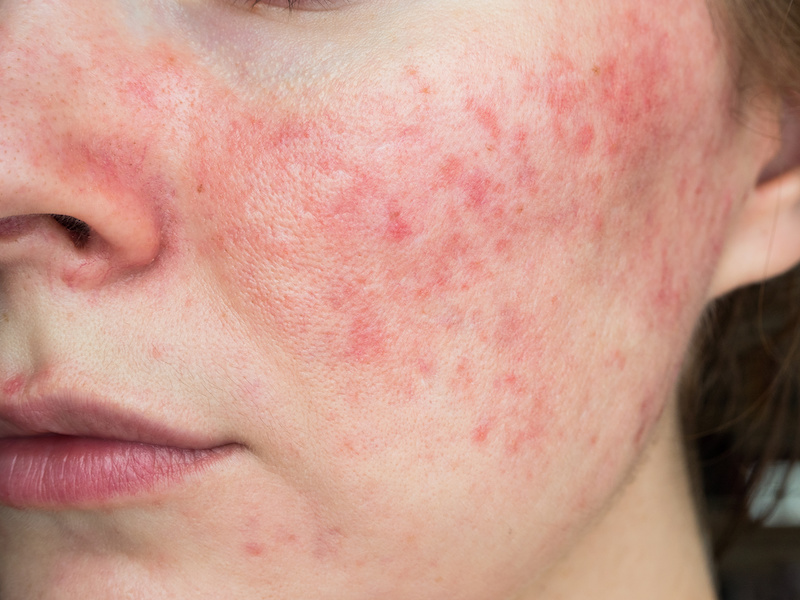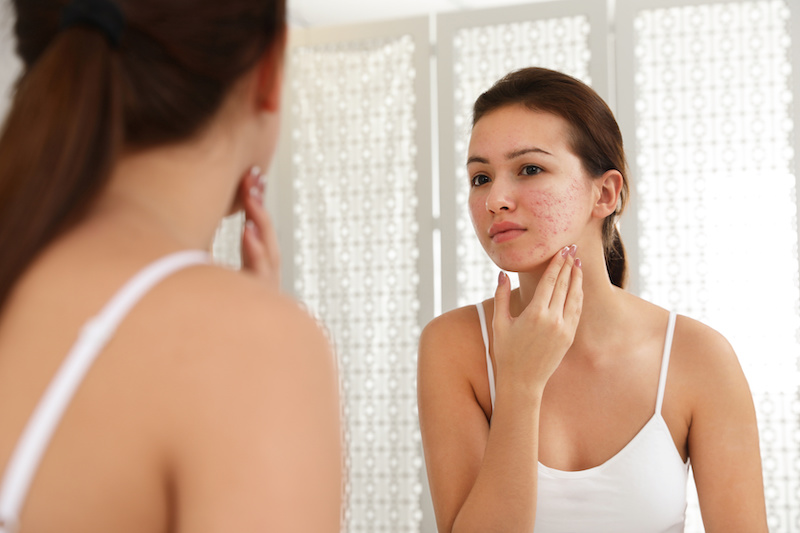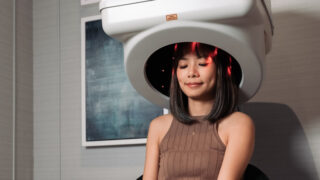What is rosacea? While this inflammatory skin condition is quite common (especially among women), it’s certainly no fun to deal with! DR CECILIA CHEN of Cutis Medical Laser Clinics tells us more about it – from what triggers it to rosacea treatment options so you can manage it effectively both in-clinic and at home.

What exactly is rosacea?
Rosacea is a chronic inflammatory skin disorder that primarily affects the face, leading to symptoms such as facial redness, flushing, visible blood vessels and small red, pus-filled bumps. The condition is episodic, which means that flare-ups are followed by periods of remission. While rosacea predominantly affects adults with fair skin and is more common in women, we don’t really know its exact cause. Researchers now believe it results from a complex interaction of genetic, environmental and neurovascular factors.
What are the symptoms of rosacea and why do we often mistake it for acne and eczema?
Rosacea can show up in different ways, usually with symptoms like persistent or occasional redness on the cheeks, nose, forehead and chin. It can also cause episodes of intense flushing. Small, dilated blood vessels may become visible on the face, along with red or pus-filled bumps resembling acne. However, unlike acne, rosacea on the face typically does not include blackheads or whiteheads.
Patients may also exhibit ocular symptoms, where the eyes become red, dry and irritated. In severe cases, rosacea on the face may lead to rhinophyma, a thickening of the skin on the nose. The overlap in symptoms, particularly the presence of redness, bumps and skin sensitivity, is a reason for the confusion. That’s why thorough historical and clinical assessments are necessary to diagnose rosacea.
What are some common triggers or causes of rosacea?
Several factors can trigger or worsen rosacea and inflammatory skin. Common culprits include heat, sun exposure, spicy foods, hot drinks and alcohol. Emotional stress, like anxiety or embarrassment, can also cause flare-ups, as well as intense exercise, wind, cold weather and certain medications, such as vasodilators and corticosteroids.
In addition, hormonal changes from menstruation, pregnancy or menopause can play a role, as well as harsh skincare products. Additionally, helicobacter pylori infections or gut microbiome imbalances may worsen inflammatory skin and rosacea.
Can I get rid of rosacea permanently?
While rosacea is treatable, there is currently no cure. However, a variety of rosacea treatment options are available to effectively manage symptoms and improve the quality of life for those affected. If you suspect you have rosacea, it is advisable to consult a doctor. Early diagnosis and treatment are key to prevent complications and reduce the condition’s impact on your self-esteem and wellbeing.
What types of rosacea treatments are available at Cutis Medical Laser Clinics?
We provide a range of rosacea treatment options tailored to each patient’s specific needs. These include topical medications like metronidazole and ivermectin, which can help reduce inflammation and redness. For moderate to severe cases, oral antibiotics may be warranted. Laser and intense pulse light treatments are also effective in targeting visible blood vessels and reducing redness. Meanwhile, skin booster treatments offer improved hydration and enhance skin barrier function.
While botox is best known for reducing wrinkles, it has also been found effective in treating some rosacea symptoms. With meso-botox, diluted botulinum toxin is injected in very small amounts into the skin’s surface, allowing it to affect the skin without significantly altering muscle movement. This procedure helps by blocking neurotransmitters that trigger vasodilation, thereby reducing redness and flushing. Another benefit of meso-botox is its ability to decrease sebum (oil) production, which can exacerbate rosacea. Additionally, Botox has been shown to have anti-inflammatory properties that further help reduce rosacea flare-ups.
We also recommend personalised skincare products, focusing on gentle cleansers, moisturisers, and sunscreens that support skin health and minimise irritation.
How do I choose the right rosacea treatment for me?
Creating an effective short- and long-term treatment plan for rosacea involves several factors, including the specific subtype, symptoms, severity of flare-ups, lifestyle and treatment expectations. Your preferences matter too! Some may prefer painless treatments, while others might be open to more aggressive but effective options. A thorough understanding of the condition and tailored medical management are crucial. I prefer to set aside extra time to listen to my patients during their first visit, discuss things they may be able to optimise at home, explore how to identify and prevent triggers, and explain the signs that indicate that they should schedule an in-office review.
Do you have any advice on managing inflammatory skin at home?
Managing and reducing skin inflammation involves a combination of lifestyle changes and mindful skincare routines. Start by identifying and avoiding triggers that worsen rosacea. Keeping a detailed journal or using a digital app can help pinpoint potential triggers.
Protecting your skin from the sun is crucial. So wear sunscreen daily, even on cloudy days, and seek shade during peak sun hours! Use gentle, alcohol-free, fragrance-free and non-comedogenic skincare products. Look for ingredients like ceramides, niacinamide, peptides and hyaluronic acid to maintain moisture and repair the skin barrier. Avoid products with fragrances, alcohol and harsh exfoliants, as they can aggravate irritation. Hydration and moisturising are vital, so choose a moisturiser suited to your skin type.
Manage stress through relaxation techniques such as yoga, meditation or mindfulness. It’s best to avoid smoking and excessive alcohol consumption, as these can worsen inflammation and delay healing.
Supplements like probiotics, omega-3 fatty acids and certain antioxidants may help reduce inflammation. A healthy diet rich in anti-inflammatory foods like fruits, vegetables and omega-3 fatty acids supports skin health. Most importantly, consistent mindfulness and professional guidance are essential for managing rosacea effectively.
About the doctor
Dr Cecilia Chen is an aesthetic doctor with an MD and PhD from Fudan University in Shanghai. She worked as a surgeon in Singapore for eight years with experience in hand surgery, microsurgery and plastics surgery, before moving into aesthetic and anti-ageing medicine. She believes in really understanding what her patients need, and doing what’s best for them long term.
Cutis Medical Laser Clinics
#08-07 Scotts Medical Centre, Pacific Plaza, 9 Scotts Road
6801 4000 | cutislaserclinics.com
Liked this article about rosacea and inflammatory skin? Read on for more beauty articles.
To make the most of living in Singapore, browse our latest City Guide here for free!







